Key takeaways:
- Political debates are crucial for shaping public perception and influencing voter decisions through emotional dynamics and candidate personalities.
- Audio news aggregators enhance information consumption by providing diverse perspectives and digestible content, making political discussions more accessible and inclusive.
- Challenges in audio debate coverage include the omission of visual cues, potential bias in interpretations, and the risk of superficial understanding due to brevity.
- The future of political debate discussions may evolve with technology, emphasizing interactive formats and personalized audio feeds, while raising concerns about exposure to diverse viewpoints.
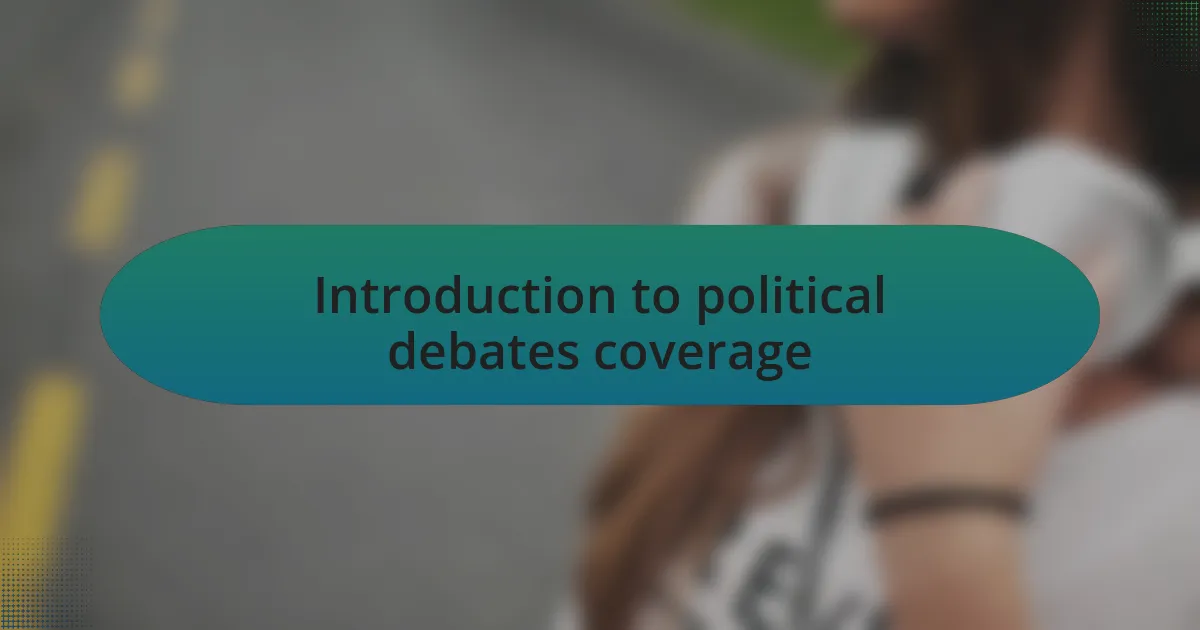
Introduction to political debates coverage
Political debates have evolved into a significant element of the democratic process, shaping public perception and influencing voter decisions. I remember my first experience watching a presidential debate; the atmosphere was electric, and I felt as if I was witnessing history in the making. It’s fascinating to think about how these discussions not only present candidates’ policies but also reveal their personalities and values.
So, what makes debate coverage so compelling? It’s not just about the facts; it’s the stories behind them. When I tune in, I’m often struck by the moments that resonate on an emotional level—the passion in a candidate’s voice or the tension during a heated exchange. Each debate brings unique dynamics that can sway opinions and mobilize voters in unexpected ways.
The proliferation of audio news aggregators has transformed how we engage with this content. I find it intriguing how we now have access to numerous perspectives and analyses, all from a simple tap on our devices. With the ability to hear various interpretations and expert insights, listeners can uncover deeper truths that aren’t always visible in standard news coverage.
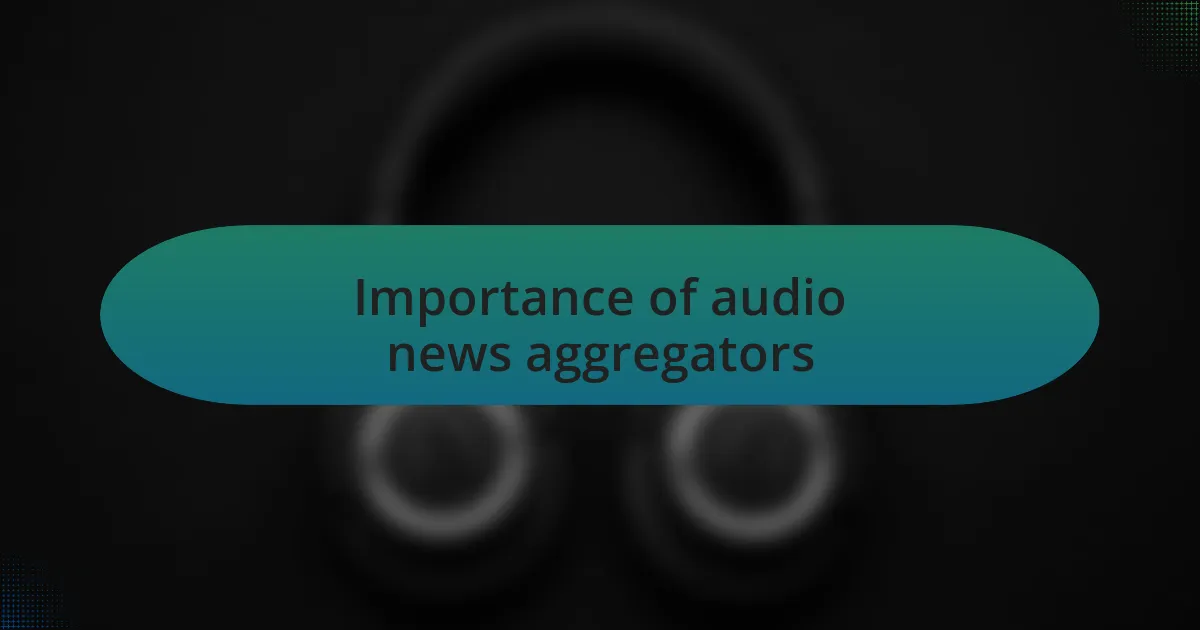
Importance of audio news aggregators
Audio news aggregators play a crucial role in how we consume information today. I often find myself scrolling through different platforms, discovering a range of opinions and analyses that I might not come across otherwise. It’s like having a personal news curator at my fingertips, ensuring I stay informed and engaged with multiple perspectives.
What strikes me most about audio news aggregators is their ability to distill complex topics into digestible segments. When I listen to summaries of political debates, it feels like I’m part of a conversation rather than sifting through dense articles filled with jargon. This immediacy fosters a deeper understanding of issues, allowing me to think critically about the implications of what I hear.
Moreover, the accessibility of audio content empowers people from all walks of life to participate in discussions. I remember a time when a friend, who typically shied away from political discourse, began engaging with debates through these platforms. Suddenly, political conversations became more vibrant and inclusive, enriching our community dialogue. Isn’t it incredible how audio news aggregators can bring newfound voices into the political arena?
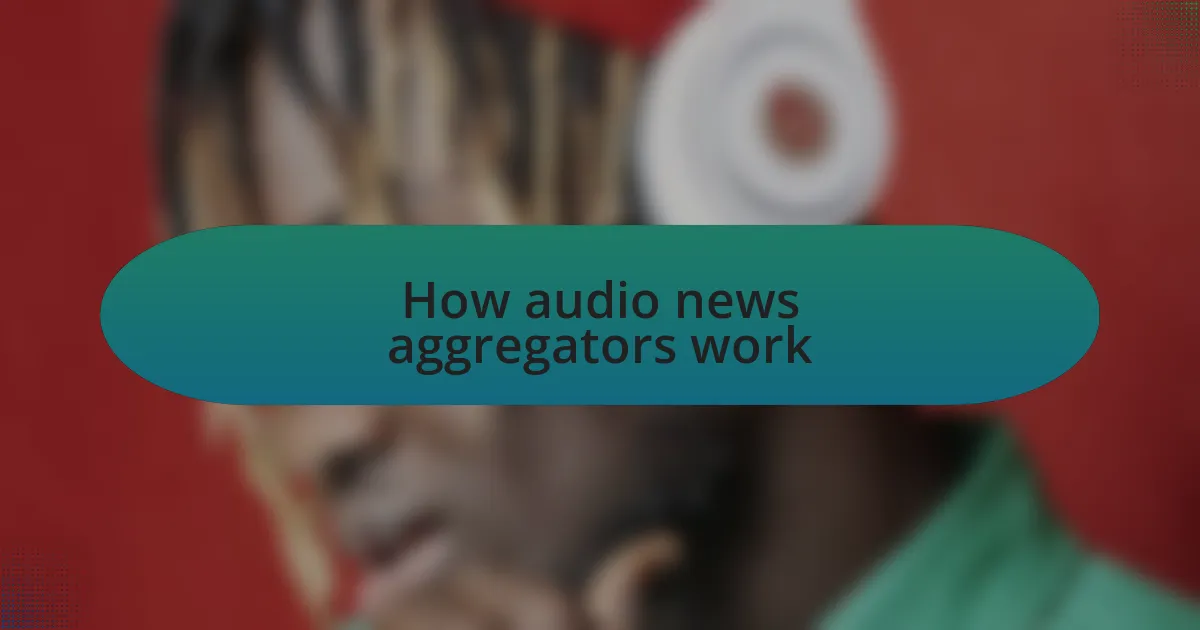
How audio news aggregators work
When you think about how audio news aggregators work, the process is quite fascinating. Essentially, they gather audio content from various sources, including podcasts, news stations, and independent creators. I remember the first time I used an aggregator; it felt like stumbling upon a treasure chest of diverse voices all in one place. How easy it is to access so many perspectives without having to search endlessly!
Once the content is aggregated, these platforms use algorithms to personalize recommendations based on my preferences and listening habits. For instance, I often find myself receiving suggestions for segments that address topics I’ve recently shown interest in, like political happenings or social justice debates. This level of personalization transforms my listening experience into a tailored journey, and I can’t help but appreciate how accurately these systems respond to my curiosities.
Moreover, aggregators often categorize content by topics, making it simple to dive into specific areas of interest. I love that I can quickly toggle between hard-hitting political commentary and lighter discussions on civic engagement. Doesn’t it feel empowering to have that choice? This structured approach not only streamlines my listening but also encourages me to explore new subjects I might have overlooked otherwise.

My insights on debate coverage
Reflecting on political debate coverage, I often find that the way these discussions unfold can significantly influence public perception. It’s intriguing how a well-timed remark can shift the momentum of a candidate’s campaign, isn’t it? I recall a particular debate that captivated me; the way one candidate stumbled under pressure left a lasting impression not just on me, but evidently on viewers across the nation, highlighting the power of a single moment.
As I listened to the coverage, I noticed the diversity of analysis from various audio sources. Everyone had a unique angle, from pundits dissecting policy proposals to listeners sharing their immediate reactions on social media. That variety not only deepened my understanding but also confirmed what I truly value about audio news aggregators: they bring together differing opinions, allowing me to form a more well-rounded perspective. How often do we get to hear these multifaceted discussions without the distractions of visual media?
Moreover, the emotional intensity of these debates often resonates with me in unexpected ways. It’s fascinating how a candidate’s passion or a well-placed critique can stir something inside, provoking me to reflect on my own beliefs and feelings. I sometimes think about whether there’s a way to fully capture that energy in written analysis. The truth is, I appreciate that the coverage can sometimes be as riveting as the debates themselves, encouraging me to think critically and remain engaged in the political process.
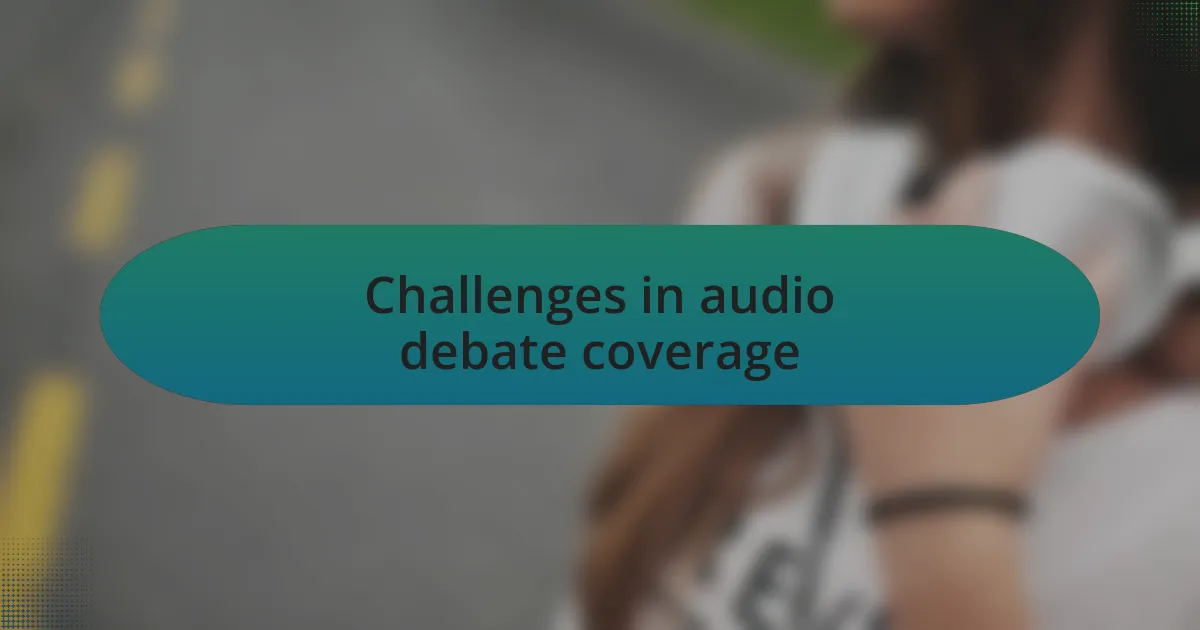
Challenges in audio debate coverage
While audio coverage of political debates brings a unique dimension to our understanding, it also faces notable challenges. For instance, I often find that sound alone can obscure the nuances of candidates’ body language and gestures, which can be pivotal in a debate. Isn’t it curious how much we rely on visual cues in our daily interactions, yet in an audio format, those layers are stripped away?
Another significant hurdle is the potential for bias in audio interpretations. Personal experiences shape the way analysts present information, and sometimes, I notice that their perspectives inadvertently color the narrative. How often do we find ourselves questioning whether we are receiving a balanced view, or are we merely being fed a curated version of the truth?
Additionally, I often feel that the brevity required in audio snippets may compromise the depth of discussion. Quick sound bites can leave listeners with only a surface-level understanding of complex issues. I wonder if the audience feels the same disconnection I sometimes experience, longing for a more robust exploration of topics that truly matter in today’s political landscape.
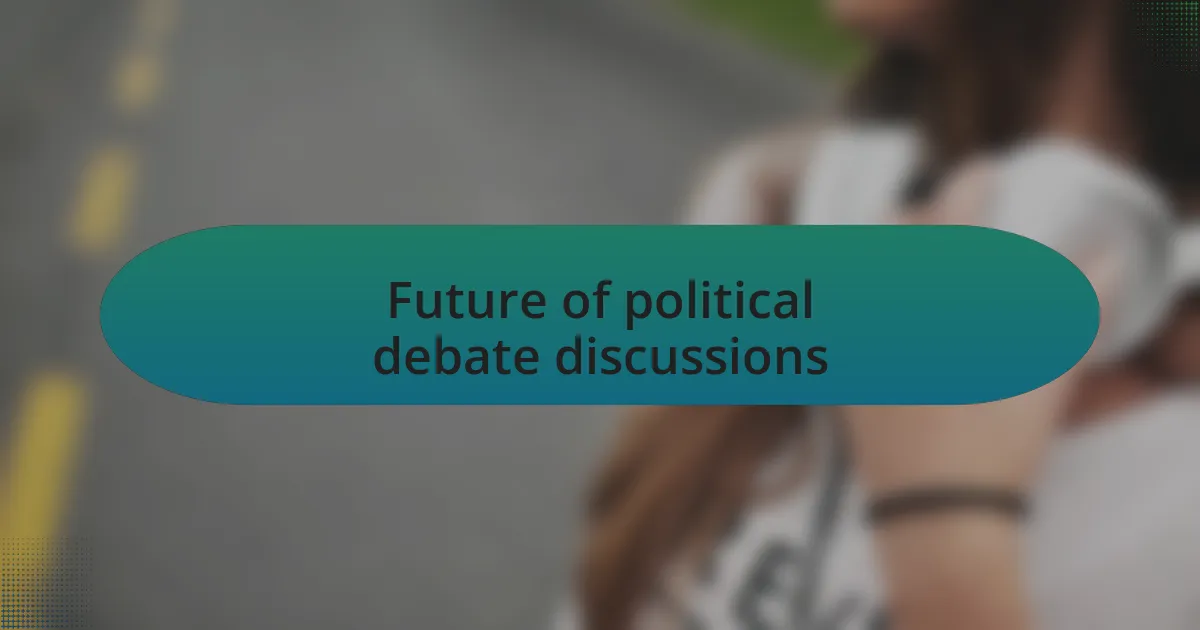
Future of political debate discussions
As we look to the future of political debate discussions, I can see audio formats evolving with technology. Imagine the possibilities of integrating augmented reality or visual aids into audio platforms. Wouldn’t it be fascinating if listeners could experience the debates more vividly, almost as if they were there, without losing the essential analytical perspective?
I also think that the rise of interactive audio platforms will encourage real-time listener participation. It’s exciting to consider how audiences might contribute thoughts or questions during debates, making discussions more dynamic. In my experience, this inclusion could foster a sense of community and shared knowledge, enriching the overall political discourse in ways we have yet to fully realize.
Moreover, I envision the growth of personalized audio feeds tailored to individual listeners’ preferences and biases. While I find this intriguing, I also wonder if it may create echo chambers that limit exposure to diverse viewpoints. How do we ensure that we remain open to various perspectives even as we curate our listening experiences? These questions certainly keep me thoughtful about the direction of political discussions in the audio landscape.